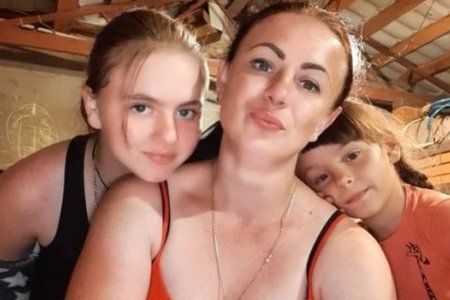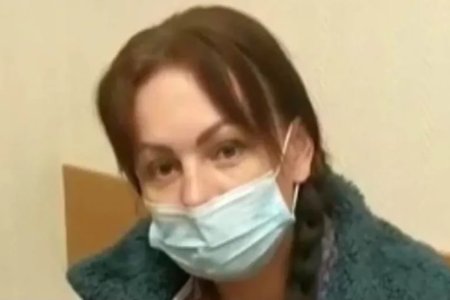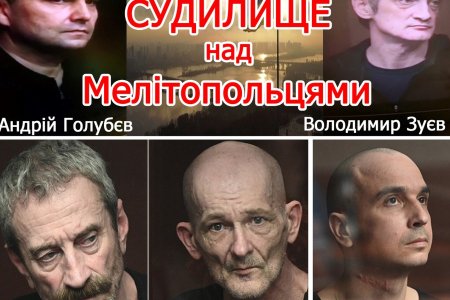
When the Russians invaded and seized control of Melitopol in 2022, 43-year-old Yulia Koveshnikova remained in the city. She could not abandon the family pets, and she hoped that Melitopol and other occupied parts of Zaporizhzhia oblast would soon be liberated. She was abducted a year later, almost certainly tortured, and ultimately sentenced to 13 years on cynical ‘spying’ charges based solely on her correspondence with her Ukrainian defender husband. In describing how the Russian persecutors sneeringly asked, after her sentence, if she still loved her husband, she wrote: “Yes, I love him and will continue to do so. He is defending his country, is on his own land, and did not invade another country’s territory”.
Although Yulia Koveshnikova’s abduction and kangaroo court sentence were reported earlier, more information is now available, with this easily sufficient for the Memorial Support for Political Prisoners Project to have, on 7 August 2024, declared the Ukrainian a political prisoner and to have demanded her release.
Koveshnikova (b. 02.09.1978) was essentially in danger from the beginning of Russia’s occupation both because she made no secret of her pro-Ukrainian views, and because her husband had been serving in Ukraine’s Armed Forces since 2014. She was clearly aware of this, and had convinced her mother, younger sister with her family, and her daughter, Anastasia, who was expecting her second child, to leave for government-controlled territory. Koveshnikova herself became active as a volunteer, searching for missing Ukrainian soldiers.
According to Anastasia, her mother texted her on 8 April 2023 to say that she was going out to pay a bill and buy some groceries and that she would ring her later. Her mother simply vanished, and relatives who came, at Anastasia’s request, to look for her, found the house locked and no sign of Koveshnikova.
According to Piervy Otdel [First Department, a human rights initiative], Koveshnikova’s relatives suspect that she was denounced by somebody she knew. They point out that, on a closed Facebook page, Koveshnikova very actively spoke out in support of Ukraine and against Russia’s invasion. She also made no secret of the fact that her husband was in the Ukrainian Armed Forces.
There are conflicting reports as to whether the period during which Yulia’s family knew nothing about her whereabouts, or even if she was alive, lasted eight or twelve months. It was only after twelve months that Anastasia received a call from the relatives of a woman who had been held prisoner together with her mother in occupied Mariupol. It is, however, possible that Anastasia first learned of the ‘spying’ charges four months earlier from an acquaintance who told her that her mother was imprisoned in Melitopol.
The charges were essentially those which Russia’s FSB have been copy-pasting from one fabricated trial to another against the Ukrainian civilians abducted from early 2022. It was claimed that, from June 2022 to January 2023, Koveshnikova had gathered information about the deployment of Russian occupation ‘Zaporizhzhia police enforcement officers, military technology and weapons’ and passed these to “her partner”, serving in Ukraine’s Armed Forces. As always, it was claimed that such information could have been used “by the Ukrainian side to inflict strikes on places of deployment of the enforcement bodies”.
It is now known that Koveshnikova was held, with a bag over her head, in Melitopol, and then taken to other occupied territory, first Mariupol, then Crimea. She has since told Russian volunteers that she was half-starved and deprived of water by her captors and also held in the dark for a long time.
Although the women where she was imprisoned do not seem to have experienced the appalling degrees of torture which they heard men being subject to, the conditions in many of these ‘prisons’ were tantamount to torture. Koveshnikova has described the pit in which she was held prisoner in Melitopol. This was literally a dug-out hole – cold, damp and uncomfortable, with water directly seeping in and taking a long time to ebb away whenever it rained.
During the first few days, Koveshnikova spoke to the guards, who were from Chechnya and Ossetia in ‘surzhyk’ (Ukrainian mingled with, or influenced by Russian). These individuals in masks set about ‘deterring’ her from doing so – they hit her around the head for each word she spoke in her native language. Others tried to force her to learn the Russian anthem, that of the USSR, Russia’s proxy Donetsk and Luhansk ‘republics’ and even a supposed ‘new Ukrainian anthem devised by the invaders.
Memorial is scathing about the ‘spying’ charges against Koveshnikova. The human rights group points out that the alleged ‘gathering of information’ essentially referred to her observations from her window which she then shared in her letters to her husband, with this claimed as ‘passing on’ such information.
The charges were under Article 276 of Russia’s criminal code, which the occupiers are using against Ukrainians from occupied territory in direct violation of international law. In essence, Memorial notes, everything about Koveshnikova’s case is in flagrant violation of the Geneva Convention on the Protection of Civilian Persons in Time of War.
This was an abduction, an enforced disappearance, and not an arrest, with Koveshnikova held for up to a year incommunicado; without any procedural status and without any access to an independent lawyer or contact with her family. Memorial points out that no ‘confession’ extracted under such circumstances could be viewed as admissible evidence.
Yet the Russians staged a supposed ‘trial’ before the illegal occupation ‘Zaporizhzhia regional court’. During this, Koveshnikova rejected the charges, however the Russian puppet ‘court’ chose instead to believe ‘confessions’ extracted during the months in which she was held incommunicado and, almost certainly, extracted either through torture or through the threat of such. Koveshnikova was sentenced on 7 June 2024 to 13 years in a medium-security prison colony.
Please write to Yulia Koveshnikova!
The letters tell Yulia that she is not forgotten and also send an important message both to Moscow and to the prison administration that their actions will be noticed. Letters need to be in Russian, and on ‘safe’ subjects. If that is a problem, use the sample letter below (copying it by hand), perhaps adding a picture or photo.
Sample letter
Привет,
Желаю Вам крепкого здоровья и надеюсь, Вы скоро вернетесь домой, к своим родным. Простите, что мало пишу – мне трудно писать по-русски, но мы все о Вас помним.
[Hi. I wish you good health and hope that you will soon be home, with your family. I’m sorry that this letter is short – it’s hard for me to write in Russian., but you are not forgotten. ]
Address
РФ 443047, г. Самара, ул. Утевская д. 18А, ИК-15 УФСИН России по Самарской области, ПФРСИ
Ковешниковой Юлии Александровне 1978 г. р.
Or in English:
Russian Federation 443047, Samara, 18A Utevskaya St, Prison Colony No. 15, PFRCI
Koveshnikova, Yulia Aleksandrovna, b. 1978



